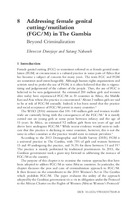| dc.contributor.author | Durojaye, Ebenezer | |
| dc.contributor.author | Nabaneh, Satang | |
| dc.date.accessioned | 2021-09-27T12:16:58Z | |
| dc.date.available | 2021-09-27T12:16:58Z | |
| dc.date.issued | 2021 | |
| dc.identifier.citation | Durojaye, E., & Nabaneh, S. (2021). Addressing female genital cutting/mutilation (FGC/M) in The Gambia: Beyond Criminalization. Advancing Sexual and Reproductive Health and Rights in Africa: Constraints and Opportunities, 115–131. https://doi.org/10.4324/9781003175049-8 | en_US |
| dc.identifier.isbn | 9781003175049 | |
| dc.identifier.uri | https://doi.org/10.4324/9781003175049-8 | |
| dc.identifier.uri | http://hdl.handle.net/10566/6824 | |
| dc.description.abstract | The purpose of this chapter is to examine the viability of the use of criminal sanction to address FGC/M in general. It then examines the nexus between FCG/M and human rights and discusses the reasons often adduced to support use of criminal law to address FGC/M. Furthermore, it focuses on the amendment to the Women’s Act in The Gambia, which prohibits FGC/M. The paper evaluates the utility of the approach adopted by the Gambian government vis-a-vis its obligation under the Protocol to the African Charter on the Rights of Women (African Women’s Protocol). The paper concludes by noting that while the prohibition of FGC/M through sanction is important, such an approach will fail to achieve its desired aim of reducing the incidence of this practice unless other complementary measures are adopted by states. | en_US |
| dc.language.iso | en | en_US |
| dc.publisher | Routledge | en_US |
| dc.subject | Female genital | en_US |
| dc.subject | Gambia | en_US |
| dc.subject | Human rights | en_US |
| dc.subject | Criminal law | en_US |
| dc.subject | Women’s Act | en_US |
| dc.title | Addressing female genital cutting/mutilation (FGC/M) in The Gambia | en_US |
| dc.type | Book chapter | en_US |

